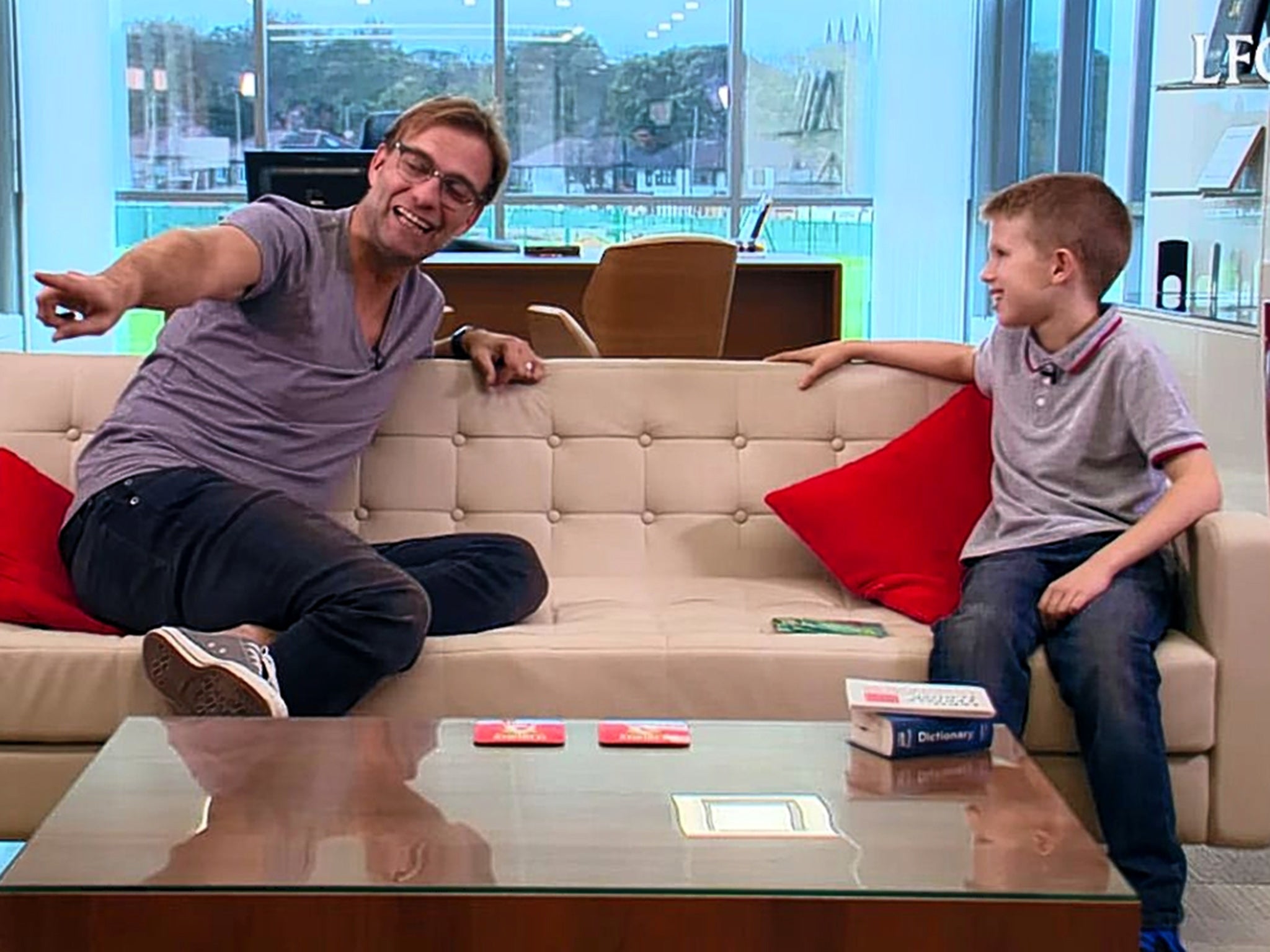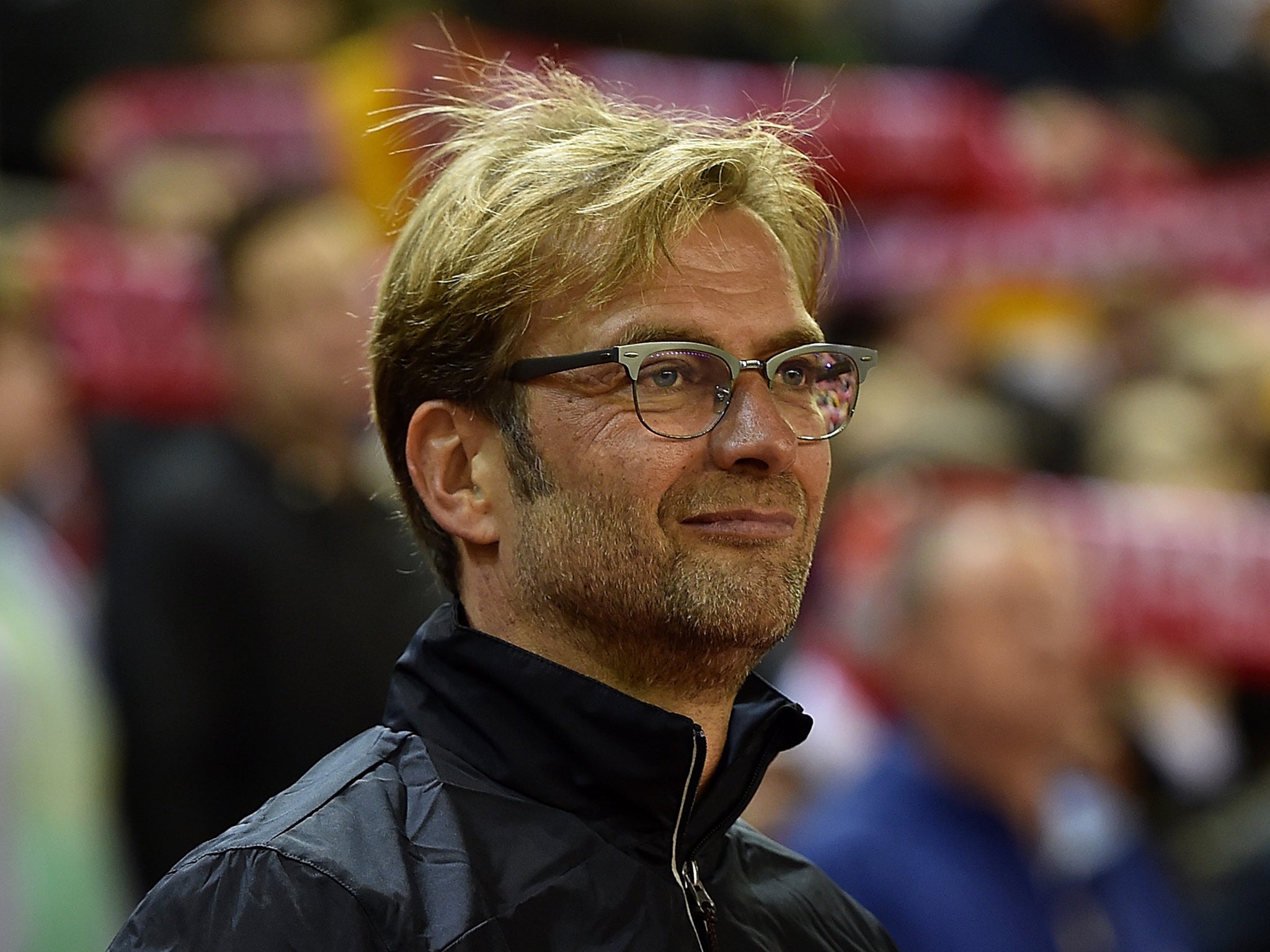Jurgen Klopp’s Scouse lessons should open English eyes to joys of integration
COMMENT: As our society circles its wagons against immigration, Klopp has strolled smiling into the camp

If Jürgen Klopp is prepared to take tuition in Scouse, then it can only be a matter of time before Jamie Carragher tries his hand at speaking English. In the meantime, football’s capacity to dismantle cultural barriers must be said to have reached a new high in the Liverpool manager’s interview this week with a nine-year-old fan.
It is not just Klopp’s willingness to give it “bifters” that has caused the video to go viral, but also the authenticity of his engagement with his impudent young instructor. Here, unmistakably, is a manager with a human connection so natural that Mario Balotelli himself, if only he had not ambled back to Italy, would probably now be harrying defenders like a terrier that can smell aniseed and celebrating his goals like Marco Tardelli.
To be fair, the charm of their exchange also owes a good deal to the scamp at the other end of the sofa, who was clearly born with precisely that kind of perky, jagged acuity associated with – well, Jamie Carragher, for a start. But Klopp certainly seems to be on exactly the right wavelength for Merseyside. In his entire professional career, remember, he has only ever had two other clubs: Mainz, first as a player and then as manager, and Dortmund. So this really could be the beginning of a beautiful friendship.
But if no German has so disarmed English prejudices since another Jürgen slithered across the turf of White Hart Lane, his Scouse lessons represent the very opposite of going native. For Klopp’s felicity as a communicator gains a literal quality in his aptitude as a linguist. It was much the same when Edin Dzeko arrived in Manchester. There was no obvious reason why a Bosnian playing in the Bundesliga should already be fluent in English (as well as German). As such, it was immediately evident that Dzeko’s footballing ability was harnessed to a cultural sensibility that could only assist him in adapting to the demands of his new environment, on and off the pitch.
By the same token, a pretty invidious connection suggests itself between the relative technical poverty of English footballers and their pathological aversion to playing abroad. Both reflect the same failure of imagination. Yes, nowadays ours happens to be the wealthiest league in Europe, with corresponding dividends in the salary of the common-or-garden player. But you would like to think that any shortfall could be amply redressed, if only for two or three years, by a less tangible type of enrichment in Germany, Italy, France or Spain.
It seems particularly barmy that these same English players should be complaining that they have no breathing space because of all these foreigners seduced by Premier League wages. (Not a problem for Eric Dier, funnily enough, after his apprenticeship in Portugal.) There is a chicken-and-egg quality to the problem, of course, in that clubs on the Continent might simply be too appalled by their deficiencies to buy British. But that never seemed to be the case in the days when our footballers were still prepared to go abroad – often, it must be said, for precisely the same venal reasons that cause their successors to stay put. A bit like Ian Rush’s Italy (albeit, understandably, he apparently disowns the analogy), the past is “almost like another country.” But you don’t have to travel in time to find a training ground, a stadium, a league, where they do things differently. As it is, we just grumble. They come over here, they take our jobs, they laugh at our close control.
At a time when our society is circling its wagons nervously against immigration, Klopp has strolled smiling into the camp, sat down cross-legged by the fire and – that mad, slightly sinister bark of laughter apart – immediately engaged the imagination of his team with an alternative take on their task. But if Englishmen are confounded by a German with a genuine sense of humour, at least they are clinging resolutely to their own stereotypes: above all in their inveterate distaste for the kind of cerebration that might prompt you to learn a new language, and cross the sea in search of new ways to express yourself on the pitch.

Football philosophy we instead reserve for Monty Python, and the sketch where the Ancient Greeks in flowing beards and togas line up against the frock-coated Germans under captain “Nobby” Hegel. For 89 minutes they leave the ball undisturbed and wander around the pitch, muttering and gesticulating. Then Archimedes exclaims “Eureka!” and kicks the ball. After a series of passes through the bemused German defence, Socrates scores with a diving header. The Germans furiously pursue the referee to dispute the validity of the goal. “Hegel is arguing that the reality is merely an a priori adjunct of non-naturalistic ethics,” says the commentator breathlessly, “Kant via the categorical imperative is holding that ontologically it exists only in the imagination, and Marx claims it was offside.”
Someone ought to show it to Klopp. He’d know just what to say: “Boss, tha”. He might be a regular guy, but there is nothing remotely normal about the winsome one.
Join our commenting forum
Join thought-provoking conversations, follow other Independent readers and see their replies
Comments